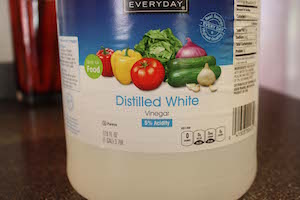Cleaning with White Vinegar
by: Dale Cox

Vinegar is one of the most versatile staples you can keep around. It's natural and can help with lots of everyday problems from clogged drains to cleaning and deodorizing jobs all around the house.
Not only is vinegar virtually harmless to the environment, it's extremely effective, and economical to use. In some cases, vinegar outperforms other products made for a specified purpose without worries about damage or toxic fumes and at a fraction of the cost.
This page contains some facts about vinegar and ways to use it to polish, deodorize, clean, and sanitize surfaces all around the house, everyday.
About White Vinegar
Vinegar is acetic acid and comes in many forms. Mostly it's used for cooking and is derived from fermented fruits and grains including: cane sugar, apples, grapes, coconut, rice, corn, etc. Distilled white vinegar used for household chores and cleaning is derived by fermenting distilled corn or malt alcohol. The final product is diluted to about a 5% acid concentration with a pH of about 12.5.
Because of its acid content, vinegar is effective at killing viruses, bacteria, mold, and mildew. It's been proven to reduce Salmonella, E. coli, other bacteria, and viruses on surfaces by 90% or more. The acid content also helps dissolve mineral and lime deposits making it useful for polishing glass and crystal, as well as copper, brass, silver, and stainless steel.
Because it's natural and biodegradable, vinegar is ideal for use around the house where children and pets can be harmed by chemical cleaners. It can also be used to wash fruits and vegetables before consumption, dissolving wax on apples and cucumbers as well as killing bacteria and mold on fresh produce of all kinds.
Uses for Vinegar
The list of household uses for white vinegar is long and varied. Below is a list of household chores where it will make your work easier and more effective. It can be used full strength from the bottle or it may be diluted with some volume of water. A spray bottle can make applying the vinegar easier and more effective on flat and vertical surfaces. Some situations make use of the reaction between vinegar and baking soda to increase the dissolving and cleaning effects.
- Deodorize: Use distilled white vinegar (unless otherwise specified) to treat odors. Either pour or place it in a container as appropriate. Let it sit anywhere from ½ hour to a couple of days depending on the odor you're dealing with:
- Refrigerator -1 cup apple cider vinegar, 2 days
- Garbage Disposal -1 cup, plus water to 1 ice tray, freeze, grind in disposal, flush
- Butcher Block -sprinkle with baking soda, spray vinegar, let foam 5min, rinse
- Cigarette Smoke -½ cup to 1 gallon water, wash walls
- Toilet Bowl -3 cups, ½ hour
- Dissolve Deposits: Vinegar acid will dissolve many types of deposits including: minerals, soap scum, and organic deposits.
- Coffeemaker -fill with vinegar, run brew cycle, repeat twice using clean water
- Brick -liberally spray full strength, wait 5 minutes, scrub with stiff brush, rinse, repeat as needed
- Teakettle -full strength, fill, boil 5 minutes, let stand overnight, rinse
- Rust -spray or soak, wait 1 hour to overnight, wipe dry
- Grease -equal parts vinegar and water, spray and wipe
- Water Marks on Wood -equal parts vinegar and olive oil, wipe with the grain, dry with soft cloth
- Glue -spray full strength, wait 5 or 10 minutes, scrub with abrasive pad or soft cloth as appropriate, repeat as needed
- Ceramic Tile -spray full strength and scrub or wipe as needed
- Clean and Sanitize: Kill bacteria, viruses, molds, and fungus effectively and safely.
- Dishwasher -2 cups, light cycle, scrub crevices
- Shower -spray and wipe full strength, wipe with baking soda, rinse
- Microwave -1 cup water, ¼ cup vinegar, 5 minutes on high, dip cloth and wipe interior surfaces
- Refrigerator -equal parts vinegar and water, spray and wipe all surfaces
- Mildew -spray full strength, wait 5 minutes, rinse, repeat as needed
- Grout -dip old toothbrush in full strength vinegar, scrub, rinse
- Polish: An effective polishing compound can be made mixing vinegar and salt or borax. Polish with the paste, rinse in clean water, and pat dry.
- Brass -1 tsp. salt, 1 cup full strength, enough flour to make a paste
- Copper -same as brass
- Bronze -same as brass
- Stainless Steel -full strength on a soft cloth
- Chrome -same as stainless steel
- Garden: Vinegar is a safe disinfectant, weed killer, and insecticide in the yard and garden.
- Insect Trap -2 cups water, 2 Tbs. sugar, ¼ cup apple cider vinegar, squirt of liquid soap
- Weed Killer -full strength directly on weed, repeat as needed
- Potting Sanitizer -full strength, spray, wait 10 minutes, rinse
Vinegar Don'ts
While vinegar is a most versatile cleaner, it shouldn't be used on everything. The acid content can damage some household surfaces. Below are places you don't want to use vinegar.
- Hardwood Floor -over time the acid will eat away at the finish on hardwood floors, use water and a microfiber mop instead
- Jewelry -can damage jewelry, both precious metals and stone settings, use warm water and liquid hand soap, brush with a soft bristled brush, rinse in warm water, let dry
- Egg Spills -vinegar will make the egg yoke coagulate and harder to remove, use soap and water instead
- Natural Stone -granite, marble, and natural stone floor tiles can be damaged by the acid, use liquid soap and warm water
- Steam Iron -acid can damage the iron, empty the reservoir after each use to prevent mineral deposits